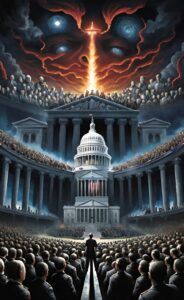In a society where conformity often reigns supreme, the government’s distaste for those who question the mainstream fake narrative is evident. The pressure to adhere to societal norms and beliefs can be overwhelming, but what happens when individuals dare to challenge the status quo?
The Role of Conformity in Maintaining Governmental Power
At its core, conformity operates as a silent enforcer of governmental dominance. It functions on the unspoken premise that aligning with collective norms and ideologies is not only expected but necessary for societal acceptance. This inherent expectation to conform underpins the government’s ability to wield power unchallenged, creating a compliant citizenry reluctant to disrupt the prevailing narrative. The mechanism of conformity subtly conditions individuals to embrace societal norms as their own, effectively sidelining dissenting voices and perspectives that diverge from the official line.
In this way, conformity acts as a buffer, safeguarding the government from scrutiny and potential upheaval by minimizing the number of individuals willing to question its actions and policies. This mass adherence to a shared set of beliefs simplifies the government’s task of promoting and propagating its narrative, allowing it to shape public perception with relative ease. As individuals internalize these norms, the fabric of society becomes intertwined with the government’s agenda, blurring the lines between individual thought and state-sponsored ideology.
In this environment, those who challenge the mainstream narrative or propose alternative viewpoints are not merely dissenters; they become outliers, often marginalized and deemed as disruptive elements. This marginalization serves a dual purpose: it reinforces the desirability of conformity while simultaneously deterring others from expressing dissent. Thus, conformity is not a passive state but an active force that perpetuates governmental power by dissuading deviation and promoting a homogeneous societal perspective.
Fear of Losing Control: Government’s Nightmare
The specter of losing grip over the masses looms large over government entities. The emergence of voices that dare to critique and dissect the established narrative threatens to unravel the tapestry of control that authorities have meticulously woven. This trepidation stems from a concern that dissent could catalyze a broader awakening, encouraging a collective questioning of policies and decisions that have been portrayed as unquestionable truths. In response, the government often resorts to tactics designed to quell these burgeoning challenges. These tactics range from discrediting dissenters to employing sophisticated propaganda techniques aimed at reasserting the dominance of the mainstream narrative.
Such strategies reveal an underlying fear: that once the floodgates of questioning are opened, maintaining the facade of unanimity and consent will become an insurmountable task. The prospect of an informed and questioning populace represents an existential threat to the status quo, as it implies a scenario where the government must continually justify its actions and decisions in the face of skeptical scrutiny.
This dynamic fundamentally alters the power relationship between the state and its citizens, shifting from a model of passive acceptance to one of active engagement and debate. It is this fear of a paradigm shift, away from conformity and towards a more interrogative citizenry, that haunts those in power, driving their efforts to maintain a veneer of control in the face of potential dissent.
The Danger in Diverse Thought and Questioning Authority
Encouraging a diversity of ideas and the scrutiny of those in power is fundamental to the functioning of a intelligent society. However, when these principles are undermined, it signals a troubling shift towards authoritarianism. By discouraging the questioning of authority and the exploration of varying perspectives, governments can erode the very pillars of freedom and liberty. This environment stifles the kind of vibrant debate and innovation that drive societal advancement and protect against tyranny. Without the freedom to challenge and critique, societies risk falling into a state of intellectual stagnation, where progress is halted, and the same old ideas are recycled without examination.
The suppression of diverse thought and the penalization of questioning authority are tactics employed to maintain a veneer of unity and control. Yet, this false unity is built on the suppression of dissenting voices, which are crucial for exposing flaws in reasoning, policy, and governance. When authorities demonize dissent and label alternative viewpoints as dangerous, they not only betray a fear of being challenged but also undermine the trust and engagement of the populace.
This breakdown in the social contract between the government and the governed can lead to widespread disillusionment and disengagement, further destabilizing the fabric of society. In essence, the real danger lies not in the presence of diverse thought and the questioning of authority, but in the suppression of these principles. By embracing a wide array of perspectives and fostering a culture of critical inquiry, societies can guard against the encroachment of authoritarian tendencies and ensure a vibrant, dynamic, and free process.
“Fake Narratives” and the Battle for Truth
The proliferation of “fake narratives” by government entities represents a concerted effort to mold public perception and fortify their hold on power. These narratives, often laced with half-truths and outright falsehoods, serve to legitimize actions and policies that might otherwise be met with widespread opposition. In the battle for truth, the role of the individual in questioning and critically examining these narratives becomes paramount. Without the active engagement of a skeptical citizenry, these deceptive narratives can go unchallenged, shaping public opinion in ways that benefit those in authority at the expense of morals and values.
The pursuit of truth in this context is not just an intellectual exercise; it is an act of resistance against attempts to manipulate and control the narrative. By actively seeking out and considering diverse sources of information, individuals can counteract the influence of fake narratives. This process involves recognizing the techniques used to disseminate misinformation, such as appealing to emotions, creating false dichotomies, and relying on authoritative figures to lend credence to dubious claims.
It is in this questioning and pursuit of diverse viewpoints that society can begin to dismantle the power structures that rely on the perpetuation of fake narratives. This effort is critical not only for the preservation of values but also for the fostering of a more informed and engaged populace. In navigating the complex landscape of modern information, the ability to discern truth from falsehood becomes a crucial tool in the arsenal of those committed to upholding the ideals of accountability.



The Consequences of Suppressing Dissent
When dissent is stifled, the ramifications permeate every layer of society, eroding the bedrock of quality principles. In an environment where questioning and criticism are met with suppression, a chilling effect takes hold, paralyzing the potential for growth and innovation. This climate of silence breeds a passive citizenry, disinclined to engage in the political process or advocate for change, thereby consolidating power in the hands of a few.
The suppression of dissent not only diminishes freedom of expression, a fundamental human right, but also jeopardizes the checks and balances essential for the healthy functioning of a community. Without the freedom to challenge governmental policies and practices, accountability diminishes, allowing for unchecked authority and the potential for systemic abuse. Such conditions pave the way for authoritarianism, where power is maintained through fear rather than respect.
Moreover, the absence of dissent stifles diversity of thought, leading to a homogenized society where innovation and creativity are casualties of conformity. The suppression of diverse voices hampers the exchange of ideas necessary for societal advancement and problem-solving. It is through the robust debate and exchange of differing viewpoints that societies find resilient and adaptive solutions to complex challenges.
Ultimately, the suppression of dissent sows the seeds of distrust and disconnection among the populace. When individuals feel their voices are unheard or irrelevant, the social fabric begins to fray, leading to alienation and a loss of communal solidarity. This disintegration of social bonds undermines the very foundations of a cohesive, dynamic, and engaged society.
Fostering a Culture of Questioning: Pathway to Critical Thinking
Cultivating an environment where inquiry is not just accepted but encouraged is vital for the development of a critically thinking society. By promoting the practice of challenging prevailing narratives, we enable individuals to engage in independent thought and rigorous examination of information. Such a culture does more than merely resist conformity; it actively propels the quest for knowledge and truth. Encouraging questioning fosters a mindset that seeks diverse viewpoints, enhancing the collective understanding and preventing the stagnation of ideas.
This approach not only bolsters morals and values but also equips people with the tools needed to navigate the complex landscape of modern information critically. In doing so, we lay the groundwork for a society that values evidence over dogma, inquiry over acceptance, and innovation over stagnation. By prioritizing these principles, we nurture a community that is resilient against misinformation and manipulation, ensuring a healthier process and a more informed, engaged populace.






